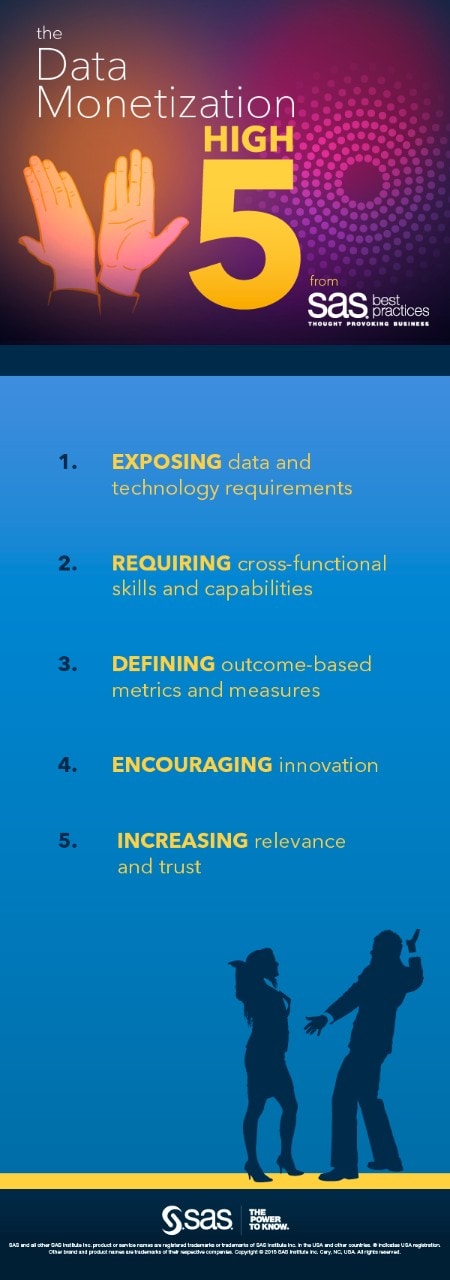5 ways data monetization can inform data strategy
By Anne Buff, SAS Best Practices
There’s more to gain from data monetization than just selling data and making money. Selling is certainly one way to monetize data, but there are endless ways companies across industries have generated significant business value through data.
Data monetization requires extensive rigor in business practices that creates five often unrecognized, nonmonetary advantages that directly inform, support and drive data strategy. These added benefits have such value that I have come to affectionately refer to them as the Data Monetization High Five.

1. Exposing data and technology requirements
Data monetization requires platforms and architectures that meet aggressive technical demands, including advanced data integration, high-performance processing, extensibility and scalability. To maximize value in monetized solutions, businesses must design architectures that support extensive reuse and the ability to reconfigure and repurpose as needed.
When considering data requirements for monetization, note that data value is measured based on a variety of attributes, including – but not limited to – volume, accessibility, speed of ingestion, accuracy, depth, diversity and completeness. It’s key for businesses to always assess these factors of value within the context of intended use, specifically in terms of what will be needed from data to efficiently and effectively solve the problem or drive a specific action.
Companies should use the technical requirements and data value assessments defined in the development of an information-based offering or service to evaluate their current capabilities. The deltas in the company’s ability to deliver the data and technology capabilities will be readily exposed and will consequently define the technical components of a strong data strategy moving forward.
2. Requiring cross-functional skills and capabilities
Strategic conversations for data monetization are not about how business and IT departments should align. Instead, they’re a shift to a full integration and commitment of cross-functional resources to solve problems and drive action through data. From data management professionals and technical engineers, to business professionals intimately familiar with industry nuances, companies should assume that specialized skills will be necessary to solve defined problems. Data strategies informed by needs for monetization or business-value generation are executed by cross-functional teams that convene and dissolve as business needs dictate. The organizational mindset is not to divide (IT and business) and conquer. The approach is to unify and deliver.
3. Defining outcome-based metrics and measures
Differing from concepts such as value chains or life cycles, data monetization has a reverse focus that starts with data usability in mind. Value is determined by measures defined by the intent of the user. This means all metrics and measures should drive desired outcomes. They are not measurements over historical time periods, correlations with past performance or comparisons against industry norms.
This does not suggest that performance metrics should be shelved. What this means is data strategies that are driven by outcome-based metrics will be less concerned with inching needles forward on dashboards and more concerned with delivering specific, defined results measured in terms of real value often expressed in monetary terms. A data strategy with measurements expressed in money made or money saved will earn executive support.
4. Encouraging innovation
The development of a data strategy is often led by the question of “What can we do with our data?” or “How can we use data to drive our business?” While these are good questions to ask, they should not be the questions that lead data strategy. The leading question should be “What do we want to achieve (the problem we want to solve) and how can data help us do it?”
Businesses that monetize data already understand that data monetization focuses on the utility of data in the context of solving problems or driving decisions. They back into needs and requirements. The creativity and ingenuity kicks in as gaps are identified. Team members are energized by problem-solving. As data monetization processes normalize, their innovative capabilities also include problem prevention. And ultimately, the true industry disruptors seek to discover problems, challenging the old adage of “If it ain’t broke, don’t fix it.” They use data to redefine “broke” and consistently raise the bar.
5. Increasing relevance and trust
There are two critical factors in establishing and sustaining value for data use: relevance and trust. And when it comes to launching a data strategy, these are two of the biggest challenges companies face. Companies that develop information-based products and services recognize their success depends on a well-built foundation of relevance and trust. Consistency and clarity are table stakes. Transparency is non-negotiable. And relevance is the key measure in the value proposition for data consumers. These core components are baked into their business models for monetization and they are critical elements of data strategy.
The promise of data monetization
Companies that commit to data monetization (internal or external) transform their business through data practices and behaviors that are inherent sources of value. Data monetization is far more than exchanging data products or services for monetary value. It’s a strategic approach to creating and sustaining business value in the context of use. Data strategy informed by the practices and behaviors required for data monetization will equip the business with a measurable plan to generate internal and external value and achieve defined business goals – the true definition of being fully data-driven.
